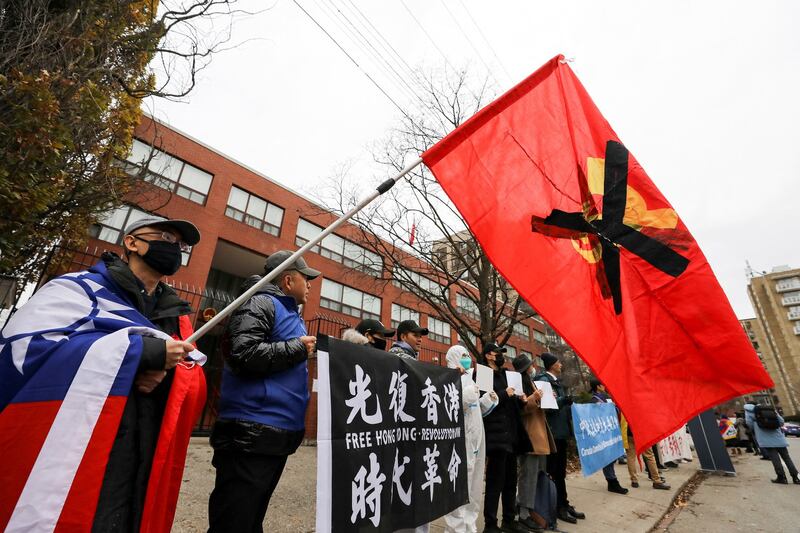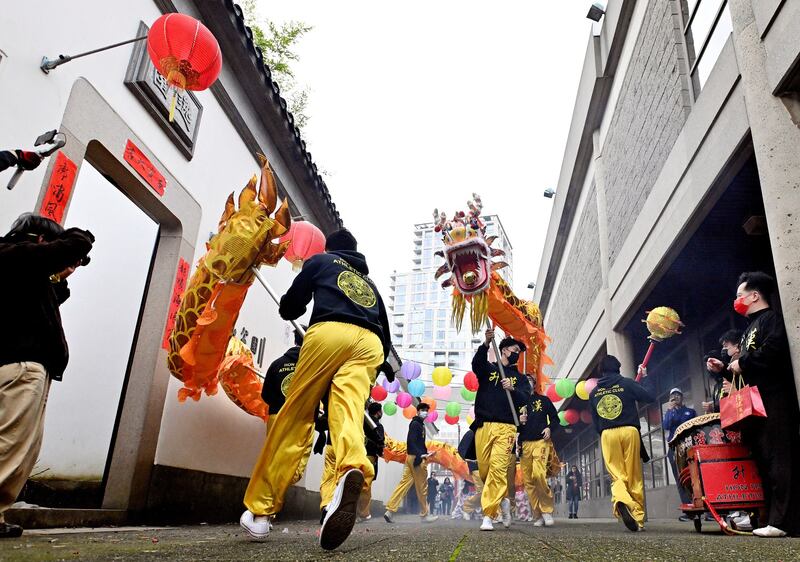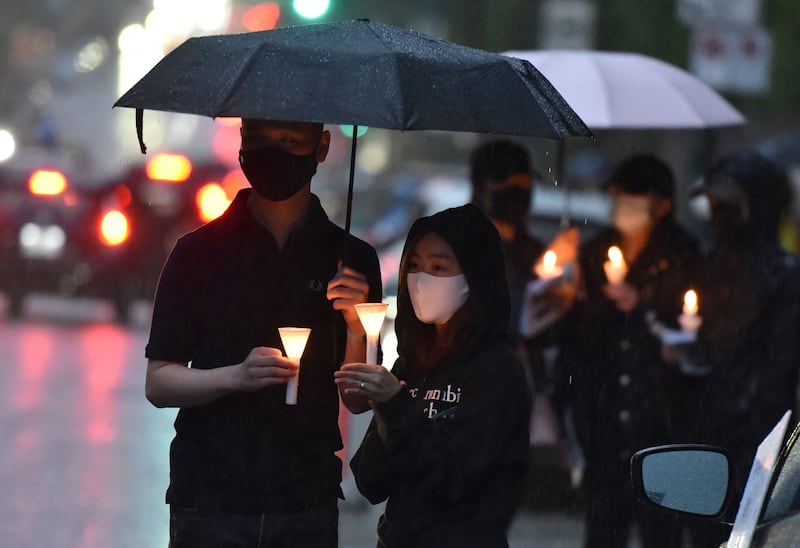The number of Chinese applying to emigrate to Canada rose 15 percent during the July-September quarter, the latest indication of widespread public dissatisfaction with life in China, particularly under the harsh anti-virus restrictions of the past three years that have hamstrung economic growth and curbed individual freedoms.
Canada’s Department of Immigration and Citizenship received 9,925 applications from Chinese people for permanent residency during the third quarter, up 15 percent from the same quarter of 2021.
The exodus, mostly of middle-class families and high-earning corporate professionals who have the wherewithal to relocate, has been dubbed the "run" phenomenon, using a Chinese character that sounds a little like the English word "run."
Lin Litong, who came to Canada as a student six years ago, said he's not surprised by the trend.
"There was a saying that became popular 10 or 20 years ago -- voting with one's feet," Lin told Radio Free Asia. "There is a deep sense of discontent running through the entire business and political elite and all through the middle class."
"It's about regaining a sense of safety and security," he said. "It doesn't matter if people say life is more complex in foreign countries ... at least people feel safe."
China's "10-point" announcement on Dec. 7 that it would loosen some aspects of the zero-COVID restrictions in the wake of mass protests across the country didn't appear to have had much effect on keyword searches for "emigration," which have been spiked several times since the Shanghai lockdown that began in late March.
While keyword searches on WeChat and Baidu saw spikes in searches for "10-point plan" and "no more PCR tests," searches for "emigration" also doubled to nearly 120 million on the day of the announcement.
Vote of no confidence
China announced strict curbs on "non-essential" overseas travel by its nationals in May, amid a surge in immigration inquiries after weeks of grueling mass testing, lockdowns and forcible mass transportation to quarantine camps.
Reports have also surfaced on social media of people leaving China for foreign study having their passports clipped and invalidated as they boarded planes, and also from people who had been denied passports when they applied for them. In April, Chinese residents were ordered to hand over any valid passports to the authorities for "safe-keeping."

Shanghai resident Xiao Zhang said the upsurge in searches for "emigration" was a kind of vote of no confidence in the government.
"This sudden uptick in discussions about emigration recorded by the WeChat Index was linked to the official announcement relaxing zero-COVID controls," Zhang said. "Many people seem to think that the current ban on overseas travel is directly linked to the zero-COVID policy, so they think that once those rules are relaxed, they have a better chance of getting out [of China]."
But in reality, Zhang said he thinks the exit ban has more to do with controlling people and capital outflows. So while the government may relax immigration rules, he suspects it will be for only a short window.
Immigration consultation
Meanwhile, business has been booming in recent years for immigration consultants, although there are signs of a potential crackdown on that sector too, with reports emerging of immigration consultants being hauled in for questioning by state security police.
Immigration consultant Huang Tianle said Canada's immigration policies tend to favor younger people, meaning that Chinese parents often send their children to study there to obtain the legal right to remain.
He said the current wave of Chinese emigration to Canada was preceded by a similar wave of people leaving Hong Kong after China launched a citywide crackdown on dissent and political opposition in the wake of the 2019 protest movement.
Many remain politically engaged even after leaving China, with considerable support seen on Canadian university campuses for the recent wave of anti-lockdown protests in Chinese cities.

Bai Yun, a musician and poet living in Canada, said she had composed a song in honor of the "white paper" movement, so named because of the blank sheets of A4 printer paper held up by protesters, that was sung at a recent rally in Toronto.
"Can you hear the sound of the dawn, a window opening to face the sun?" the crowd sang.
Sunny Sonam, chairman of the Toronto branch of the Tibetan Youth Association, said he was optimistic that people have a clearer idea of the way forward, despite the tailing off of public protests on the streets of Chinese cities in recent days.
"People realize that enough is enough," Sonam said. "It's terrible when power is concentrated in the hands of one person."
"Of course this wave of protests will slowly dissipate as zero-COVID restrictions are lifted, but people now know that standing together is an effective way to make their voices heard."
Propaganda machine
There are signs the Chinese Communist Party's censorship and propaganda machine is fighting back against the exodus of well-heeled professionals.
While the #emigration hashtag on social media typically garners tens of thousands of daily views, much of the content focuses on the disadvantages of living overseas, suggesting some kind of intervention by the ruling Communist Party's "public opinion management" system.
At their peak, search queries for the keyword "emigration" hit 70 million several times during the Shanghai lockdown between March and May, and 130 million immediately afterwards. The same keyword also showed peaks on Toutiao Index, Google Trends and 360 Trends between April and the end of June 2022.

More recently, the hashtags #escapefromGuangzhou and #escapefromZhengzhou were trending amid COVID-19 lockdowns in those cities.
Shanghai-based Xu Xiangcheng, who works in education, said he has been preparing to leave China since the national security crackdown on Hong Kong in 2019.
Xu, who is in his 40s, said that he was educated in the communist system, but that his generation has a deep affinity for Hong Kong and Taiwan. “Hong Kong means a lot to us."
Giving up the dream
He said he once had a fantasy that he could do something to “make Chinese society better,” but the “forcible occupation of Hong Kong by the Communist Party and the suppression of such ideas there made me think I didn't want my kids getting an education in this kind of environment," he said. "So I made up my mind to emigrate three years ago."
Xu said many of his friends have the same idea.
"They didn't decide this until this year, because the situation deteriorated," he said. "I feel that there is no hope for this place, so I have to leave."
While Xu has been in contact with an immigration consultancy, his plans were hugely hampered by the zero-COVID policy.
"I have run into problems preparing the materials to support my visa application, because there is always so much [bureaucratic] back and forth in China," he said. "A lot of documents are unavailable due to lockdowns."
"Schools are suspended and my bank is closed, along with government departments, which makes things very difficult," he said.
“Things are really miserable”
Henan-based current affairs commentator Li Fatian said there are plenty of rural residents who are hoping to leave, too.
"Small and medium-sized enterprises have been hit hard by the pandemic restrictions," Li said. "There are no jobs, and businesses are still paying rent despite being forced to close their doors."
"This stupid, one-size-fits-all policy makes it impossible for a lot of people to survive [in China]," he said. "Things are really miserable right now."
Li said many migrant workers have been forced back to rural areas by lockdowns, which has likely defused wider anti-government unrest due to lower population density and less access to timely information.
Current affairs commentator Fang Yuan said most people now want to escape the strict anti-virus rules, one way or another, even if leaving the country isn't an option.
"The exodus from large, medium and smaller cities to rural areas is the main form of escape, or fleeing cities under lockdown," Fang said. "It's disruptive to daily life, because these are essential workers."
Translated and edited by Luisetta Mudie. Edited by Malcolm Foster.
